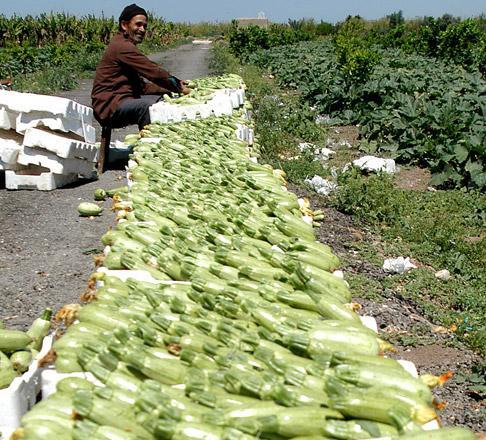You are here
Labour Ministry issues new measures to regulate foreign labour in agriculture sector
By Sawsan Tabazah - Nov 22,2017 - Last updated at Nov 22,2017
AMMAN — The Labour Ministry on Wednesday issued new measures to regulate the foreign labour in the agricultural sector after removing a one-year ban on recruitment.
According to the Ministry’s spokesperson Mohammad Khatib, the ministry allows recruitment of other nationalities in the agriculture sector besides Egyptians, who constitute the largest number of workers in the sector.
President of Jordan Farmers Union Owdeh Rawashdeh estimated the number of Egyptian workers in the agriculture sector to be around 100,000, saying that most of them work in other sectors.
The regulations stated the signing of a two-year contract between the employer and employee with the aim of protecting the rights of both parties, as well as allowing the worker to work in other farms at the same area under the permission of the employer.
It also required the farmer or his representative to receive the worker under his sponsorship when he arrives in the Kingdom even when he gets back from a visit to his country.
However, Khatib noted that implementation of this measure has been delayed until the ministry and farmers associations agree on new procedures.
Rawashdeh described the regulations as a measure to protect the rights of both the employer and employee, however he said receiving workers from entry points will increase burden on farmers.
“Receiving the worker from the borders [Egyptians usually come via sea and move from Aqaba to their location of workplace] will cost farmers extra transportation fees especially those living in Mafraq, the Jordan Valley and Salt. This will also take one or two working days and will delay the procedures,” Rawashdeh added.
However, Egyptian workers in Jordan considered this decision as “anti-labourer” and would lead to “exploitations”.
Mohammad, an Egyptian worker in Jordan told The Jordan Times that sponsors would request workers to pay them compensation once they arrive for receiving them from the border or the airport to the work place which can cost up to JD150.
Another worker, who spoke on condition of anonymity, said that it is “insulting and inhumane to be not allowed to enter the country unless someone received him as if he was a package”.
Khatib explained that the decision was aimed at preventing human trafficking of guest workers as the ministry recorded cases where workers were being deceived by fake job offers. He also added that in some instances workers paid around JD2,000 to come to Jordan but once they arrived they were left without a job or work permits.
These cases were referred to the anti-corruption unit, he noted.
The ministry has requested a bank guarantee from farmers who wanted to recruit over five workers to prevent any attempt of human trafficking, the ministry spokesperson noted.
Rawashdeh said that they are negotiating with the ministry to raise the number of guest workers without a bank guarantee to 10.
Related Articles
AMMAN — The Jordan Valley Farmers Union on Monday expressed disappointment in the Labour Ministry’s measures to ease restrictions on the rec
AMMAN — The Ministry of Labour lifted the ban on hiring foreign labourers outside Jordan to work in the agricultural sector, according to a
AMMAN — The Jordan Valley Farmers Union (JVFU) on Tuesday announced the continuation of the recruitment of foreign workers in the agricultur

















